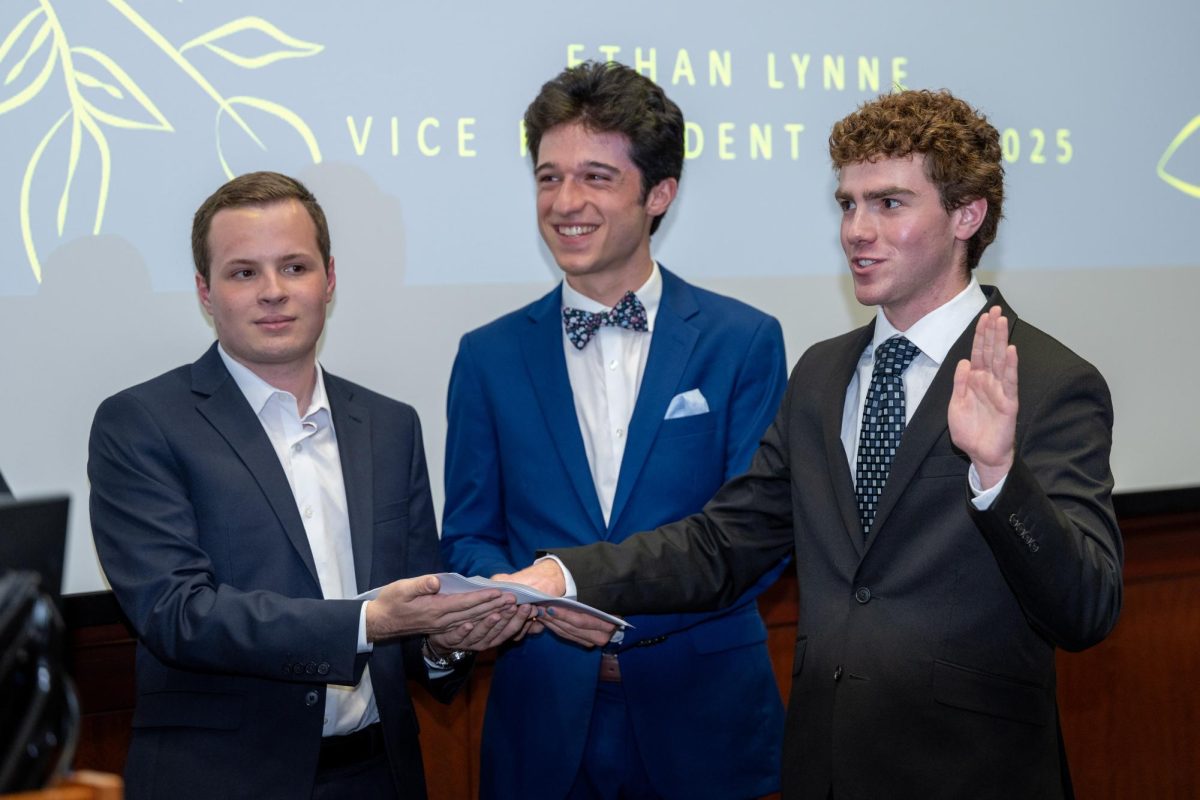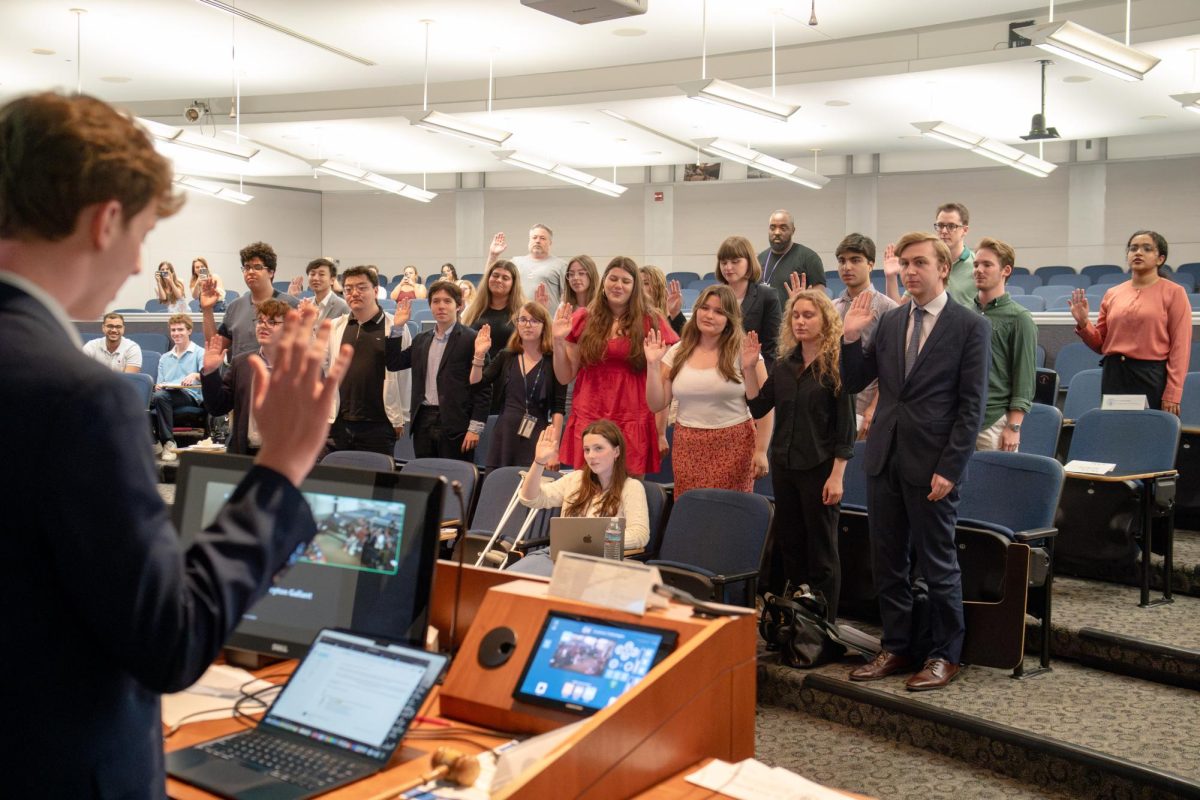Officials installed two new contraceptive vending machines with reduced product costs last week in a further effort to increase the accessibility and affordability of birth control on campus.
Officials installed one machine in the basement of District House and one machine in West Hall on the Mount Vernon Campus on Wednesday after first installing a machine in the University Student Center in January. Officials, in collaboration with GW Reproductive Autonomy and Gender Equity — a student organization that works to educate the student body on reproductive justice — lowered the price of morning-after contraceptive pills in the machines from $30 in January to $15.
Student Association President Arielle Geismar is set to further subsidize the cost of the morning-after pill in the machines by putting $1,000 dollars of her executive budget toward the project, which will further lower the contraceptive’s unit price to $10. While the machines still list the price of the morning-after pill as $15 as of Sunday, Geismar said officials will implement the new price “imminently” after she finalizes logistics Monday.
Maddy Niziolek and Stephanie Spector, the co-presidents of RAGE, said the machines will also stock tampons, condoms and pregnancy tests in addition to a generic morning-after pill.
“We really believe that if there’s going to be a Plan B vending machine, it should be more affordable and accessible,” Niziolek said.
Niziolek and Spector said they began discussions in June about lowering the cost of the morning-after pill and moving the machine from the student center with Brian Joyce, the assistant dean of student life.
Spector said the vending machine company that worked with students to install a machine in the student center in January had a contract to use a specific brand of the morning-after pill, AfterPill, which required the University to keep the cost at $30 per dose. She said the new machine contractor does not have an agreement with a specific brand of the pill, allowing officials and student leaders to subsidize the price.
The vending machines’ placement in the basement of District House, which is open to students 24/7, means contraceptives will now be accessible to students at all times of the day. RAGE leaders had requested officials install the machines in buildings with continuous access, as the student center closed daily from midnight to 7 a.m.
Niziolek and Spector said their organization released a statement calling on the University to provide a more affordable option immediately following the installation of the original machine in January. The group pointed to other schools like Northeastern University, which offers the morning-after pill for $7 in their vending machines.
RAGE launched a petition calling for officials to improve the machines Jan. 24. Niziolek said the petition received signatures from nearly 700 students, as well as 40 student organizations and 20 faculty members.
Niziolek said if former SA President Christian Zidouemba’s administration, which spearheaded the original installation, had consulted student organizations like RAGE before moving forward, subsidized contraceptives and expanded access could have been available from the start. Niziolek said officials told her the SA picked the company that could most quickly install a machine in an effort to complete the project “as soon as possible,” instead.
Geismar said she heard about student complaints concerning accessibility and affordability, leading her to meet with RAGE leaders early in her tenure as SA president. Geismar said RAGE asked her to fund one-third of the cost of the morning-after pill, and she agreed to fulfill their entire request by putting $1,000, or one-fifteenth, of her executive budget towards the project.
Geismar said her decision to help reduce the cost of the morning-after pill in the machines aligns with her goal of improving reproductive justice at GW.
“This is one of the larger projects, so it’s really important to me,” Geismar said. “I know to fund all that is definitely a considerable amount of money, but, as a young woman, it’s really important that what I’m spending my money on reflects my values and the things that I care about.”
Geismar said the Vern’s vending machine instantly improves access to reproductive care for hundreds of students who will no longer have to travel to Foggy Bottom to use the machines.
“The opportunity to have quick and easy access on Mount Vernon means that students have more ease in health care and have more decision-making power,” Geismar said.
Sophomore Ava Beatriz Stamatelaky said she heard about the new vending machine updates through RAGE’s Instagram account and said she also wants to see communication directly from the University to further awareness about the new installations. Stamatelaky said having a contraceptive machine on campus is vital in reducing the “stigma” around contraceptive use.
“Ordering it directly in person can be very intimidating for some people, especially when your age is taken into account,” Stamatelaky said.
Trinity Ihekwoaba, a sophomore majoring in computer science who lives on the Vern, said more people are likely to use the new machine in West Hall because contraceptives were difficult to obtain when the only machine was previously located in Foggy Bottom.
“It’s a good decision, especially on the Vern because I’m on the Vern. I know that having to come over here to get it and then having to go back, people are just going to opt to not get it at all,” Ihekwoaba said.
Cammie Dopke, a first-year medical student who received her graduate degree in maternal and child health at GW, said she thought it was “awesome” that the University took steps to support reproductive freedom on campus and that she hopes to see other institutions install similar machines.
“With recent laws around abortions, it’s just nice to know that at least GW’s campus culture is supporting people’s freedom of choice,” Dopke said.











